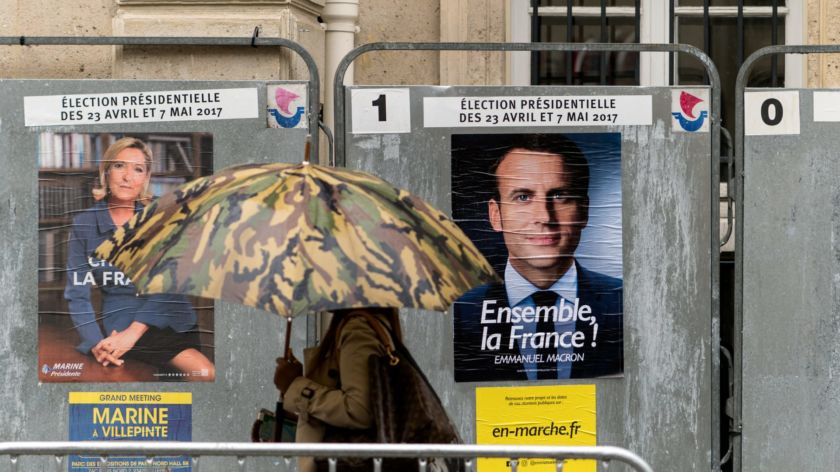‘Television debate between Macron and Le Pen will be crucial’
-
 Verkiezingsaffiches in 2017. Foto: Lorie Shaull (via Flickr)
Verkiezingsaffiches in 2017. Foto: Lorie Shaull (via Flickr)
The second round of the French presidential elections is going to be a neck-and-neck race between the current President Emmanuel Macron and far-right politician Marine Le Pen. 'If Le Pen wins, the Franco-German axis as the centre of the European Union will disappear,' says historian Jan-Willem Brouwer.
With 27,6 percent of the vote, current President Emmanuel Macron of the centrist party La République en marche! won the first round of the French presidential election yesterday. He received 4,2 percent more votes than Marine Le Pen of the far-right Rassemblement National. The far-left Jean-Luc Mélenchon came in third with 21,9 percent of the votes.
In two weeks’ time, the second and decisive round of the presidential election will take place. Like five years ago, it will be a duel between Macron and Le Pen. During the second round, only the two candidates with the most votes from the first round still compete.
Dire situation
In 2017, Macron won convincingly with 66,1 percent of the vote, but this time it will be much more exciting, Jan-Willem Brouwer of the Centre for Parliamentary History expects. ‘I just read on the website of the French newspaper Libération that the situation for Macron is dire because all the votes for the far-right Eric Zemmour (7 percent, ed.) will go to Le Pen,’ he says. ‘Macron does not have such a bonus from any other party at the moment.’
How do you interpret the results of the first round of the presidential election?
‘For a sitting president, Macron’s result is not so bad. After his first term in office in 2012, Nicolas Sarkozy, for example, got 27 percent. All predictions were that Marine Le Pen would come very close, with 4,2 percent there is still some margin.’
‘That does not alter the fact that 30 percent of the voters in France voted for far-right politicians, for Le Pen and Zemmour. And more than one in five voters chose the far-left.’
‘The socialists and the republicans, the two big power blocs in French politics, have been completely wiped out. Parisians overwhelmingly did not vote for their mayor Anne Hidalgo (1,7 percent, ed.), the candidate of the Parti Socialiste. Republican candidate Valérie Pécresse (4,8 percent, ed.) didn’t do well either, partly because of infighting in her party.’
Why do the current elections seem to be much more exciting compared to five years ago?
‘I thought it was very exciting five years ago. Donald Trump had just been elected in the United States, and there was a fear that Le Pen would repeat the same trick in France. Macron was still presenting himself as a new candidate.’
‘Perhaps Eric Zemmour now plays a role in the increasing chances for Le Pen. He is even more right-wing, which may have made Le Pen more socially acceptable. Strangely enough, Zemmour was judged on the fact that he is pro-Putin, but not Le Pen. While on the website of the Rassemblement National she is still pictured with Putin, and she has never distanced herself from her sympathy for Putin.’
‘The election debate in a week and a half will be crucial. Five years ago Le Pen made a very bad turn. If that happens again, then Macron has a good chance.’
‘If Le Pen wins, the Franco-German axis as the centre of the European Union will disappear’
Did Emmanuel Macron campaign to little?
‘I don’t know. He was a bit late with his déclaration (candidacy, ed.), but that is not exceptional. In the past, sitting presidents never campaigned much. But in the next two weeks, he will have to work hard, especially if he wants to win the votes of the Mélenchon voters. He is seen by many French people as the president of the rich, of the elite, with a history of banking. He will have to attack Le Pen on her positions on the European Union, Ukraine, purchasing power promises and so on.’
What is the role of the war in Ukraine in the presidential election?
‘It is mainly economic, in the form of high inflation and declining purchasing power. The yellow vest protests were already a problem for Macron, as were the lingering climate policy and the crumbling welfare state. These problems have, partly due to the war in Ukraine, only become bigger.’
What happens if Le Pen wins?
‘Then France will have a Europhobic president who pursues a liberal policy. I don’t know how long the financial markets can keep this up. France’s public debt and budget deficit are already enormous.’
‘And then we haven’t even talked about the European Union. Le Pen may want to keep the euro, but she wants to give priority to people with French passports on the labour market and in housing. This will lead to Hungarian conditions in France and the disappearance of the Franco-German axis as the centre of the European Union. German Chancellor Olaf Scholz will have to pull out all the stops in that case.’




